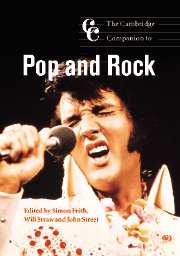3 - Consumption
from Part I - Context
Published online by Cambridge University Press: 28 September 2011
Summary
In March of 2000, the head of the United States-based MTV Networks outlined, to a journalist, his techniques for understanding the tastes of teenagers. ‘We actually in some cases put people under hypnosis’, said 54-year-old Tom Freston, ‘and we will videotape their lives.’ As he spoke, albums by teen stars Britney Spears and ‘N Sync were breaking all-time records for first-week sales of new titles in the United States. While alarmed rock critics bemoaned the predictability of adolescent tastes, Freston saw teenage culture as an elusive, mysterious world. To understand it, he had recourse to the methods of the psychotherapist and anthropologist.
The consumption of popular music has long been seen as chaotic and incomprehensible, even when it seems to confirm the crudest laws of hype and fashion. While trends seem driven by their own, unstoppable momentum, the popularity of any given recording or musical style is notoriously difficult to predict. Long-term prognoses about the music industry's development have regularly proved wrong, and even the rosiest of cyclical booms will often coincide with predictions of that industry's imminent obsolescence. Alongside the image of millions of consumers rushing to shops to purchase Britney Spears’ ‘Oops! … I Did It Again’, newspapers offered the spectre of thousands of United States college students in their dormitories, busily (and perhaps illegally) down-loading songs from the Internet. As album sales, in the United States and other countries, continued their upward climb in 2000, Internet industry newsletters spoke of a dying industry, deserted by consumers who now demanded music in cheaper, more convenient forms.
- Type
- Chapter
- Information
- The Cambridge Companion to Pop and Rock , pp. 53 - 90Publisher: Cambridge University PressPrint publication year: 2001
- 8
- Cited by



